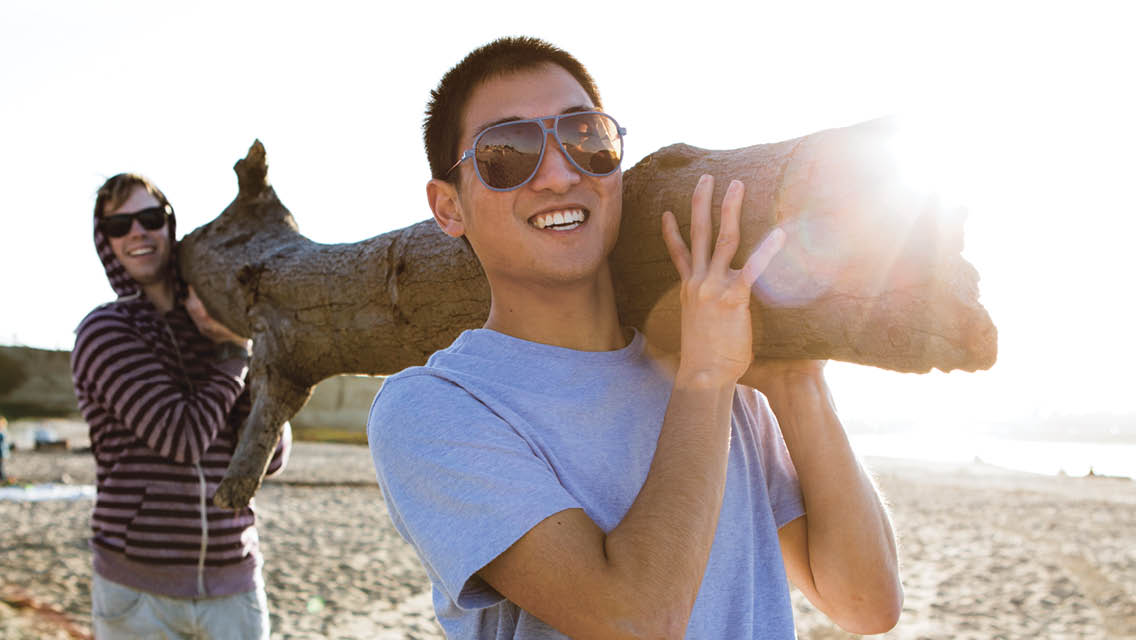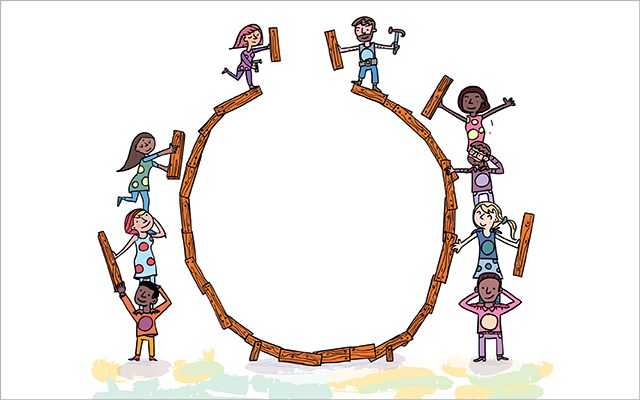Jim, Chris, Mike, and Paul have been friends since the late 1980s. They met in college, when they were all playing in rock bands — sometimes the same one — and have remained close. When the pandemic hit, Chris texted a video message to the three others: “I’m going to need you guys more than I usually do to get through this.”
He made a proposal: Each day, one of the four would take a turn picking a musician to celebrate. They would text the name of the artist to the group and then they would all listen, read, watch related films — anything that could spur conversation.
“It felt like a great idea from the start,” says Jim Schaldach, an elementary-school social worker in St. Paul, Minn.
The first musician they chose was John Prine, who had just been diagnosed with COVID-19. Prine later passed away from its complications, and the group grieved the loss together.
As the pandemic upended many normal routines, Schaldach prized the consistency of the ritual. “It’s kind of like having a place and time to meet every day. I know I’m going to hear from all of them — even if someone only has time to give a thumbs up on the text.”
That feeling of security is one of the many emotional benefits friendship provides. But the paybacks extend far beyond emotional health: Close friendships also support our physical health.
“Research shows that having a healthy, stable social network makes us more resilient against things like depression, anxiety, and insomnia,” says Kate Leaver, author of The Friendship Cure. “There’s also proof that it can protect us from physical health problems, like cancer, heart attack, and stroke, as well as actually helping us to live longer.”
This much is clear: Sustaining our friendships improves our well-being. Though it isn’t always easy or straightforward, nurturing and strengthening these connections is worth the effort.
Embracing Platonic Relationships
Friends can make us laugh, offer support, and simply listen to us vent when we need it. But these are things family members often provide — so what makes friendship so special?
“Friends, ideally, bring us joy, trust, loyalty, and companionship that we crave and need outside of a romantic relationship, and even our family members,” says Leaver. “It’s a different sort of chemistry and support we have with our friends.”
Yet we often devalue friendships, she notes, especially as we get older and settle into familial routines and obligations. “We’re legally bound to the person we marry, or seriously committed to someone we share a long-term love with, or co-parent with. And we are biologically tied to our family members. When we’re busy, it’s easy to prioritize those people over our friends.”
Still, focusing mainly on our romantic partners while ignoring everyone else can stress friendships and partnerships. When we expect a partner to meet all our needs, we may be cultivating “toxic monogamy.”
“We so often make the mistake of expecting too much from a single romantic partner,” Leaver explains. “We expect them to be our friends, our lovers, our confidants, our coaches, our cheerleaders, our therapists, and our family.”
Friendships can take some of the pressure off that partner relationship. At the same time, they provide support in ways a partner or family member cannot.
“Often the connections with friends can be even more important than family,” says Deborah Tannen, author of You’re the Only One I Can Tell: Inside the Language of Women’s Friendships. “There’s a special kind of feeling understood — feeling seen — that can come with friendship.”
Leaver concurs. “We really do need friendships in order to have our best mental and physical health,” she says. “So it’s vital to make space and time to see the platonic loves of our lives, too.” (For a look at the effects of loneliness and isolation, see “The Effects of Loneliness and Isolation“.)
Building Health Through Friendship
Friendship, it turns out, is a bulwark against a range of health issues. Leaver lists a variety of studies that demonstrate the connection between good health and a strong social network: “Having a stable, warm, high-quality social network can not only improve heart health, but also give you a potentially stronger defense against Alzheimer’s disease, delay cognitive disrepair, make you fitter, lower your chances of obesity, change your dietary habits, lower your blood pressure, and give you a higher pain threshold.”
Unsurprisingly, then, building close friendships can increase our lifespan — and not cultivating them can shorten it. One meta-analysis of 148 studies found that participants who lacked strong social relationships had a 50 percent increased risk of premature death from all causes. This mortality risk, according to Harvard Health, was “roughly comparable to smoking up to 15 cigarettes a day, and greater than obesity and physical inactivity.”
Friendship may even prevent the common cold. In a study at Carnegie Mellon University, 276 healthy volunteers were exposed to a cold virus and observed for a week. “We found that the more diverse people’s social networks — the more types of connections they had — the less likely they were to develop a cold after exposure to the virus,” notes study leader and psychologist Sheldon Cohen, PhD.
Yet even as plenty of studies are demonstrating friendship’s health benefits, Leaver says they’re confirming what most of us already know from experience: “We can usually tell that seeing and talking to our friends is good for our mental and emotional health just by noticing our own mood when we spend time with people who lift us up and love us.”
Handling Friendship Conflict
When Ann Friedman and Aminatou Sow met in Washington, D.C., a decade ago, they connected instantly. They bonded over shows, including Gossip Girl, NYC Prep, and RuPaul’s Drag Race, snacking and chatting on their couches for hours at a time. They attended weddings together. They also created Call Your Girlfriend, a popular podcast that explores the topic of friendship in greater detail.
Then, after about six years, the two found themselves unable to communicate as they once had. Each of them questioned whether their friendship could be saved.
This makes sense, they explain in their book Big Friendship: “If intimacy is what makes family and romantic relationships both so rewarding and so complicated, why would it be any different for a Big Friendship? When two people entangle their emotional lives, it’s bound to be difficult sometimes,” they write. “Any Big Friendship will face existential threats.”
One of their podcast guests, psychologist Miriam Kirmayer, PhD, agrees. “There is this overarching idea that our friendships, particularly our friendships as adults, should be easy,” she notes. “And what I mean by ‘easy’ is the expectation that first we should’ve learned how to make and keep friends as children or teens, and that the same rules that we lived by during those years apply in adulthood — and that we should just have it figured out.”
The other piece of that, Kirmayer adds, is that we believe “friendships should not involve any kind of conflict or heartache, and that the minute that shows up, it says something about our relationship with our friend.”
But conflict is a normal part of any relationship, especially close ones, she explains. “It’s not the absence of conflict that makes a friendship close — it’s how we use that conflict to bring ourselves closer together.”
Sow and Friedman eventually entered therapy together to understand and heal their schism. “It still seems weird to say, ‘We went to therapy to save our friendship,’” they write. “But it doesn’t sound so ridiculous when the flip side could easily be, ‘We didn’t do everything we could to save our friendship.’”
Not all close friends have the resources (or the inclination) for therapy, but other strategies can help repair a fractured friendship. If you’re talkers, be open about your feelings and discuss them. If yours is a friendship that’s more action than talk, then don’t be afraid to be the first person to suggest an outing together after a rift. Trust is often rebuilt in small increments.
Counting Casual Friendships
Close friends are great, but they’re not the only ones that matter. We need a variety of friendships to sustain optimal mental and physical health.
Leaver recommends that people diversify their “emotional profile,” by meeting their various needs through multiple types of relationships. A diverse profile will include family, romantic partners, casual friends, serious friends, old friends, new friends, work friends, friends who reflect our favorite qualities back to us, and friends who challenge us.
Workplace friendships can offer particular benefits — both for employees and for their employers. “Research consistently and overwhelmingly suggests that people with at least one strong work friendship perform better, think more creatively, show more initiative, and get better results,” Leaver notes. “They get sick less often, have fewer accidents, and change jobs less frequently.”
Even friendly relationships with passing acquaintances — the person you wave to daily on your morning walk, the smiling bagger at your grocery store — boost your health. Some experts suggest they qualify as love relationships in themselves.
“Love blossoms virtually anytime two or more people — even strangers — connect over a shared positive emotion,” notes psychologist Barbara Fredrickson, PhD, in her book Love 2.0. She calls these moments of connection “positivity resonance,” and says these micro-moments of positivity change us at the biological level, helping us to fend off illness and maintain good physical health.
Making New Friends
There’s no doubt that making new friends as an adult can be difficult. “When we get older, it’s harder both internally and externally,” says psychologist Elizabeth Lombardo, PhD. “Externally, we’re simply not exposed to as many people — and it’s less expected that you’ll become friends.”
Yet you can create new relationships, especially if you adjust your expectations and start small. Focus on people you already have something in common with — work colleagues, neighbors, acquaintances from your health club. Take an online class. Join a community group.
And don’t be thrown off by a little awkwardness when you first start to hang out with a new friend. That “good stress” can be beneficial.
“Reaching out to people who aren’t in our comfort zones produces a lot of innovation and spurs creativity,” says University of California, Berkeley psychology professor Dacher Keltner, PhD, author of The Power Paradox. Connecting with people outside our familiar groups can also boost professional success, longevity, overall well-being, and happiness.
The first step toward diversifying our network of friends and acquaintances, says Keltner, is simply to pledge to do so. “Commit to expanding your social circle like you would commit to an exercise regimen, eating less meat, or driving less. Make that kind of commitment.” (For more on making friends as an adult, see “Making Friends As an Adult”.)
Keeping Friendships Strong
Staying attached to a close friend can boil down to three main factors: rituals, assurances, and openness, says Emily Langan, PhD, a Wheaton College professor who studies attachment theory in the realm of serious friendships.
Just as families celebrate holidays and romantic partners mark anniversaries, friends need to make their own rituals, Langan says. This could be an annual trip together, a weekly FaceTime meeting, or a daily check-in by text.
The ritual that Schaldach and his friends created early in the pandemic provided a ballast for their friendship during a period of necessary physical distance. “There’s a real sense of security that has come with knowing that the friendship is being fed and is continuing to grow, even though we can’t get together face-to-face,” he says.
Assurances, Langan explains, involve finding “verbal and nonverbal ways to tell each other you plan to be there in the future.” This could involve making plans — even if it’s just fantasizing about a trip you’ll take together in a few years — or it could be something simple and concrete, like what Sow and Friedman did: getting matching tattoos.
And there’s openness — an essential ingredient for closeness. This requires a special kind of vulnerability with friends, who are under no technical obligation to stick around.
“I can call my spouse out on something because the assumption is they have to stay,” Langan says. “In friendship there’s a pretty strong fear of abandonment, fear of loss, because you don’t know necessarily that the person’s going to stay with you. Because they don’t have to.”
Still, if your friendship is feeling strained for any reason, ignoring those feelings will not make them go away. Finding a way through the tension usually requires some vulnerability while communicating your feelings and concerns.
Finally, be as open as possible about your positive feelings, too.
“Don’t just occasionally think of your friend fondly,” Langan suggests. “Tell them that your life would lose meaning if they disappeared from it. Tell them that you love them. Tell them exactly why you want to hold on to this friendship and make it last.”
The Upside of Animal Friends
Our furry (or feathered, or even reptilian) friends provide more than just companionship: Having a pet is a boon for health. According to the Centers for Disease Control and Prevention, pets provide us with reasons to get outside and exercise. Routine walks, play, and cuddling with our animal companions can help reduce blood pressure, as well as cholesterol and triglyceride levels.
In addition, their companionship can lower the risk of depression by offsetting loneliness. “Increases in beta-endorphin, oxytocin, and dopamine — neurochemicals associated with positive feelings and bonding — have been observed in both dogs and people after enjoyable interactions like petting, play, and talking,” according to a 2015 Scientific American report.
The article goes on to say that “interacting with a dog, particularly a known dog, can have some of the same psychophysiological markers as when two emotionally attached people spend time together.”
This article originally appeared as “Friendship Matters” in the April 2021 issue of Experience Life.





This Post Has 0 Comments